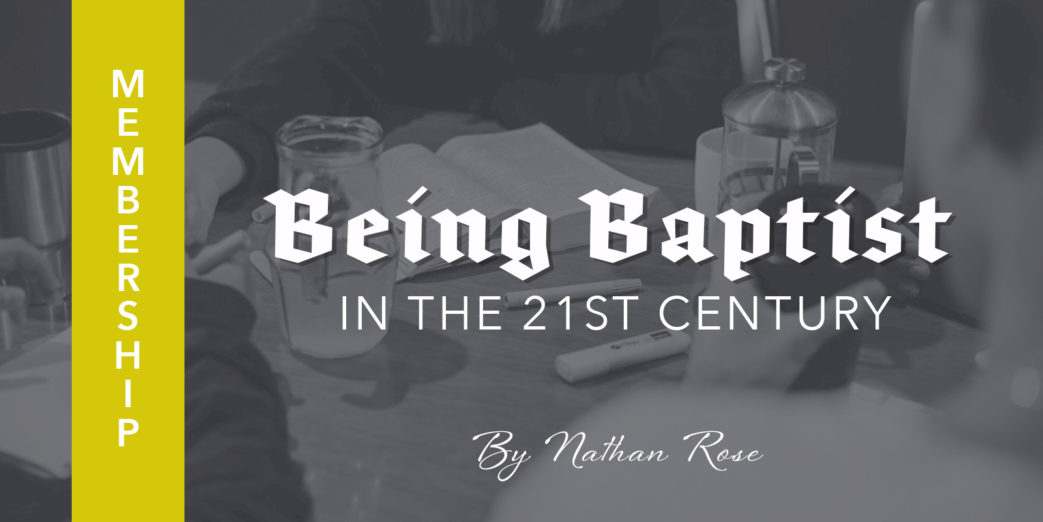BY NATHAN ROSE
When I became the pastor of Liberty Baptist Church in March of 2012, our average Sunday morning worship attendance hovered around 120. However, our membership rolls recorded a total of 654 members! This meant over 80% of our congregation had not participated in the life of the church for at least a year.
One of my first tasks was to address our inaccurate membership roll. We began to contact these individuals systematically, learning where they were and encouraging them to rejoin us. Most never responded to our repeated attempts to connect, so after a year and a half, I led the church to remove these inactive members.
Many in our church had never witnessed the dismissal of inactive members before. Some questioned why we would do this, viewing it as unkind and unloving. However, I assured our church that removing these inactive members was biblical, beneficial, and baptistic.
What is Regenerate Church Membership?
Since our beginning, Baptists have believed that church membership should be limited to those who have experienced regeneration. Regeneration (or the new birth) is the supernatural work of the Holy Spirit upon a spiritually dead person resurrecting them to spiritual life, making them a new creation in Christ, and enabling them to walk in obedience to God (John 3:1-5; Eph. 2:4-5; 2 Cor. 5:17; Titus 3:5).
While several distinctives set Baptists apart from other Protestants, regenerate church membership is chief among them. This distinctive states that a local church should be comprised only of baptized individuals who have experienced and show evidence of regeneration. This latter component—evidence of regeneration—is especially important.
For centuries Baptists have emphasized that a local church should only include “visible saints.” Our earliest confessions have stressed this. The First Baptist London Confession, published in 1644, describes the local church as “a company of visible Saints, called and separated from the world, by the word and Spirit of God, to the visible profession of the faith of the Gospel.” The Second Baptist Confession, published 45 years later, also affirmed this: “The members of these churches are saints by calling, visibly manifesting and evidencing (in and by their profession and walking) their obedience unto that call of Christ.”
Our Baptist forefathers believed from Scripture that the miracle of regeneration was invisible, but its effects never were (Ezek. 36:26-27; John 3:8). Those who experienced the new birth always evidenced that in a life of godliness and obedience to Jesus. Therefore for someone to join a Baptist church through baptism, he or she must give some evidence of regeneration. Additionally, those members who cease giving evidence through their persistent disobedience should be removed from membership via formal church discipline.
Why is Regenerate Church Membership Important?
Not only is regenerate church membership a Baptist hallmark, understanding and regulating it is essential for the health and purity of every local church. Those churches that disregard it do so to their own peril. Below are a few reasons why.
First, disregarding regenerate church membership will lead to nominalism. A nominal Christian is someone who is not genuinely converted but is a Christian in name only. Careless membership practices and neglecting church discipline increase nominalism because they blur the distinction between those who are regenerate (i.e., the church) and those who are not (i.e., the world).
Second, the neglect of regenerate church membership will dilute the purity of the church. Allowing unconverted persons to join and remain members will inevitably cause a church to become less and less holy. Unregenerate individuals are spiritually incapable of pursuing holiness, so their lives will display unrepentant and consistent sin.
Third, overlooking regenerate church membership severely hinders another important Baptist distinctive: congregational church government. If unregenerate individuals remain on the membership roll, they will possess the ability to make some important decisions relating to the life and ministry of the church. This, of course, is a recipe for disaster.
How Should We Maintain Regenerate Church Membership?
To avoid these negative consequences, Baptist churches can work to uphold this historical and essential distinctive in the following ways:
1. Pastors must ensure their church members hold a biblical understanding of conversion and can recognize the accompanying signs of the new birth. For example, they could teach through the book of 1 John, which explains that regenerate people believe the truth of the gospel, consistently obey God’s commands, and sacrificially love fellow brothers and sisters.
2. Churches should only baptize individuals who profess faith in Christ and give some evidence that they have been regenerated. In other words, their profession of faith must be credible. This doesn’t mean a church should only baptize someone after they become a mature believer, but they should go beyond asking a few simple questions. There is a big difference between knowing the correct “Sunday School” answer and experiencing the new birth.
3. Pastors must lead their church, in accordance with the biblical practice of church discipline, to lovingly and patiently remove disobedient members who display with their actions that they are not converted. This practice might make some feel uncomfortable, but Baptists must remember that Jesus created and requires it in every local church (see Matt. 18:15-20).
I led Liberty Baptist Church to remove our inactive members because these individuals had stopped giving evidence of regeneration. They were no longer visible saints. In their baptism, they had professed to be born again, but because of their persistent disobedience (see Heb. 10:25), they revealed their hearts had not been regenerated. I’m certain many misunderstood our motives and intentions, but our church was not being unkind or unloving. Instead, we were acting in accordance with biblical teaching as well as our baptistic heritage.

